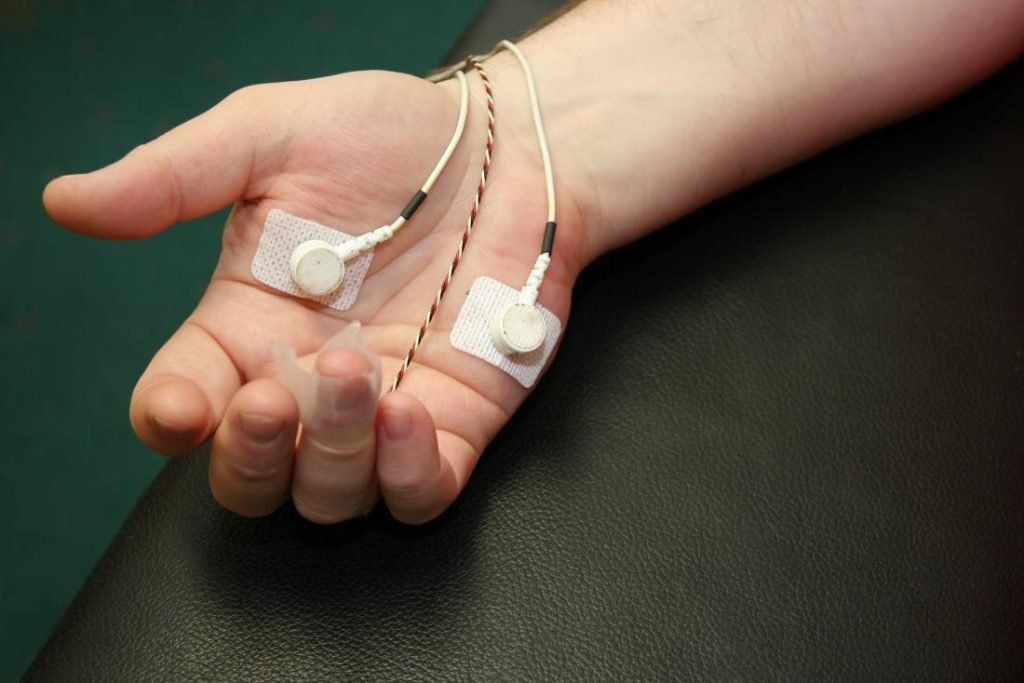What is Biofeedback?
The role of biofeedback is to bring out changes in biological parameters using voluntary measures. During the process, biological functions like heart rate are monitored, and the information thus received is fed back to you using visual/other sensory cues. Biofeedback therapy in Delhi helps you use techniques like relaxation to control these biological functions.
What are the Different types of Biofeedback?
Multiple biological parameters can be measured using existing medical technology. Depending upon the parameter being measured different types of biofeedback are in use. Some of the most common ones are:
- Heart rate Using an oximeter/electrocardiogram (ECG) monitoring
- Muscle contraction: Using an electromyograph (EMG) to monitor muscle contractions
- Brain waves: Electroencephalography (EEG) monitors different brain waves.
- Sweat gland activity: Electrodermograph (EDG) measuring the amount of sweating and sweat gland activity
- Breathing: During respiratory biofeedback, the breathing pattern is monitored
- Temperature: Body temperature is monitored using sensors attached to extremities
What Mental illnesses can be treated using Biofeedback?
Biofeedback is used in the treatment of multiple disorders.
- Anxiety: Biofeedback from various parameters is used to treat anxiety disorders. There is an increase in heart rate, respiratory rate, sweat gland activity, and muscle tension during episodes of anxiety. Any one or combination of these parameters, along with relaxation techniques, is used in the treatment,
- Chronic pain: EMG biofeedback is used in chronic pain disorders like chronic low backache, headache, etc
- Insomnia – Biofeedback therapy in Delhi can help people with insomnia improve their sleep patterns. Individuals can learn relaxation techniques, regulate their sleep-wake cycles, and promote better sleep hygiene by monitoring sleep-related physiological signals, such as heart rate and muscle tension.
- PTSD – Biofeedback therapy can help individuals regulate their physiological responses to trauma triggers, aiding in treating PTSD. Individuals can reduce hyperarousal symptoms and improve emotional well-being by learning relaxation techniques and self-regulation strategies.
- Attention Deficit Hyperactivity Disorder (ADHD): Neurofeedback (EEG biofeedback) can help treat ADHD. By monitoring brainwave activity, individuals can learn to regulate their brainwaves and improve attention, impulse control, and cognitive functioning.
- Mood Disorders: Biofeedback therapy in Delhi can help people with depression and bipolar disorder. Individuals can gain insight into their emotional states and learn techniques to regulate mood, promote relaxation, and manage stress by monitoring physiological responses and providing feedback.
- Other psychiatric indications include
- Fibromyalgia
- Chronic fatigue syndrome
Other medical indications:
- Migraine
- Epilepsy
- Motion sickness
- Raynaud phenomenon
How Does Biofeedback Therapy Work?
Biofeedback therapy is based on the idea that people can learn to manage their physiological processes by getting real-time input on their bodily functions. It measures physiological factors such as heart rate, skin temperature, muscle tension, and brainwave activity with specialized sensors and monitoring systems. These measures are then transformed into auditory, visual, or tactile input for the individual.
The individual is linked to the sensors during a biofeedback session, and the signals from their biological functions are related to a computer or a monitoring device. The feedback is delivered understandably, allowing the individual to monitor and comprehend their physiological responses.
Individuals become aware of minor changes in their physiological responses that they may not have been aware of earlier. Individuals are taught strategies to consciously manipulate their physiological systems under the supervision of a skilled biofeedback therapist. They learn to control their physiological processes by deliberate modifications such as deep breathing, relaxation techniques, and mental images.
Individuals gain the ability to control their physiological responses without the need for biofeedback equipment over time and with practice. They can use the techniques they’ve acquired daily, even in situations that previously caused tension, anxiety, or discomfort. With continued practice, individuals can increase their self-regulation and find relief from symptoms linked with multiple illnesses.
Why Choose Biofeedback Therapy?
Biofeedback therapy is an option that allows people to develop control over their physiological processes and enhance their overall health. Sensors and monitoring equipment offer real-time feedback regarding bodily functions such as heart rate, blood pressure, muscular tension, and skin temperature.
Individuals can learn self-regulation strategies and create good adjustments in their physiological reactions as a result of this feedback. Biofeedback therapy has various advantages and can significantly impact physical, mental, and emotional health.
Reduced Stress – Stress reduction is one of the critical advantages of biofeedback therapy. Individuals can learn to recognise early signs of stress and use relaxation techniques to counteract them by monitoring physiological stress indicators, such as increased heart rate or muscle tension. This can decrease anxiety, improve mood, and better overall stress management.
Pain Management – Biofeedback therapy is also helpful in the treatment of pain. This therapy option can assist individuals in gaining control of chronic pain issues by giving them skills for regulating physiological responses and reducing pain perception. People can reduce pain intensity and reliance on pain medication by becoming aware of their physical reactions and adopting relaxation techniques.
Manage Health Conditions – Another advantage of biofeedback therapy is its ability to treat various mental health disorders. It has demonstrated potential in treating anxiety disorders such as GAD and panic disorder. Individuals can identify triggers and practice coping skills to lessen anxiety by monitoring physiological responses.
Better Physical Health – If you want to improve your physical health, biofeedback therapy in Delhi can help you. It helps treat hypertension (high blood pressure) by teaching patients relaxation techniques that regulate blood pressure. It can also help people with respiratory problems like asthma by teaching them how to control their breathing patterns and lessen bronchial constriction.
Athletic Performance – Biofeedback therapy in Delhi can also improve athletic performance. Athletes can improve their performance by learning to regulate heart rate, muscle tension, and other vital indicators by monitoring physiological reactions during training or competition. This can contribute to better focus, concentration, and overall athletic performance.


